-
 Bitcoin
Bitcoin $85,181.4576
0.55% -
 Ethereum
Ethereum $1,600.7372
0.98% -
 Tether USDt
Tether USDt $0.9999
0.01% -
 XRP
XRP $2.0883
0.92% -
 BNB
BNB $592.4828
0.74% -
 Solana
Solana $138.7084
2.67% -
 USDC
USDC $0.9999
0.00% -
 Dogecoin
Dogecoin $0.1590
2.50% -
 TRON
TRON $0.2418
-1.18% -
 Cardano
Cardano $0.6301
2.59% -
 UNUS SED LEO
UNUS SED LEO $9.3588
1.36% -
 Chainlink
Chainlink $12.8630
1.65% -
 Avalanche
Avalanche $19.5072
1.68% -
 Stellar
Stellar $0.2468
2.21% -
 Toncoin
Toncoin $2.9911
-0.01% -
 Shiba Inu
Shiba Inu $0.0...01220
2.08% -
 Hedera
Hedera $0.1663
0.29% -
 Sui
Sui $2.1506
1.41% -
 Bitcoin Cash
Bitcoin Cash $338.3770
2.53% -
 Hyperliquid
Hyperliquid $18.1017
6.61% -
 Polkadot
Polkadot $3.7270
1.24% -
 Litecoin
Litecoin $76.2040
0.93% -
 Dai
Dai $1.0000
0.02% -
 Bitget Token
Bitget Token $4.4577
2.21% -
 Ethena USDe
Ethena USDe $0.9992
0.02% -
 Pi
Pi $0.6468
6.09% -
 Monero
Monero $212.8810
-1.80% -
 Uniswap
Uniswap $5.2693
1.19% -
 Pepe
Pepe $0.0...07270
1.33% -
 OKB
OKB $50.7701
1.10%
What is the "Lightning Network"? How does it solve the congestion problem of the Bitcoin network?
The Lightning Network boosts Bitcoin's scalability by processing transactions off-chain via payment channels, resulting in faster, cheaper payments, but requires technical expertise and careful key management for security.
Mar 11, 2025 at 12:55 pm
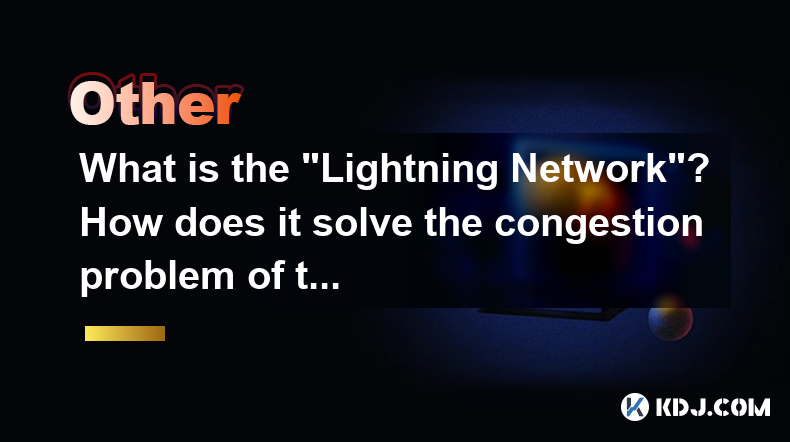
Key Points:
- The Lightning Network is a layer-2 scaling solution for Bitcoin, operating on top of the main blockchain.
- It addresses Bitcoin's scalability issues by enabling faster and cheaper transactions off-chain.
- Transactions are conducted through a network of payment channels, significantly reducing the load on the Bitcoin blockchain.
- Setting up and using a Lightning Network node requires technical knowledge and understanding.
- Security and privacy are key concerns, requiring careful management of private keys and channel operations.
What is the "Lightning Network"?
The Lightning Network is a layer-2 scaling solution designed to improve the scalability and efficiency of the Bitcoin network. Instead of each transaction being individually recorded on the Bitcoin blockchain, the Lightning Network allows for numerous transactions to occur off-chain within a network of interconnected payment channels. This drastically reduces the load on the Bitcoin blockchain, enabling faster and cheaper transactions. Think of it as a highway built on top of a regular road, allowing for much faster travel.
How does it solve the congestion problem of the Bitcoin network?
Bitcoin's blockchain has a limited transaction processing capacity. As the network grows, this limited capacity leads to congestion, resulting in slower transaction speeds and higher fees. The Lightning Network alleviates this congestion by moving the majority of transactions off the main blockchain. Transactions are conducted within micropayment channels established between participants, only requiring on-chain transactions to open and close these channels. This significantly reduces the number of transactions that need to be processed on the main blockchain.
How does a Lightning Network transaction work?
Imagine Alice and Bob want to make numerous small payments to each other. Instead of each payment individually hitting the Bitcoin blockchain, they open a payment channel. This involves a transaction on the Bitcoin blockchain that establishes a fund locked in a multi-signature address. Then, they can send payments back and forth within this channel without registering each payment on the blockchain. Only when they close the channel is the final balance updated on the blockchain.
- Alice and Bob agree to open a channel.
- They each deposit funds into a multi-signature address.
- They exchange payments within the channel.
- They close the channel, updating the balance on the Bitcoin blockchain.
This process allows for near-instantaneous transactions with minimal fees.
What are the advantages of the Lightning Network?
The primary advantage is increased scalability. The Lightning Network enables Bitcoin to handle a significantly larger volume of transactions than it could otherwise. Beyond scalability, it also offers faster transaction speeds. Payments are near-instantaneous, unlike the delays often experienced on the Bitcoin blockchain. The lower transaction volume on the main chain translates directly into lower transaction fees for users.
What are the disadvantages of the Lightning Network?
While offering significant advantages, the Lightning Network also presents some challenges. The initial setup and management of a Lightning node can be technically complex, requiring users to understand cryptographic concepts and operate specialized software. Furthermore, users need to manage their private keys carefully to maintain security and prevent funds from being lost. If a node goes offline, its channels become unavailable until it reconnects, potentially disrupting transactions.
What are the security and privacy implications?
Security relies heavily on the secure management of private keys. Compromising a private key can lead to the loss of funds within the Lightning Network. Privacy is also a concern, as while transactions within the channel are off-chain, the opening and closing of channels are still visible on the Bitcoin blockchain. Therefore, while transactions are more private than on-chain, they are not completely anonymous.
What is the future of the Lightning Network?
The future of the Lightning Network is promising. Ongoing development efforts aim to improve usability and security. Increased adoption is expected as the technology matures and becomes more user-friendly. The potential for widespread adoption could revolutionize micropayments and small-value transactions, unlocking new possibilities for Bitcoin and other cryptocurrencies.
Frequently Asked Questions:
Q: Is the Lightning Network suitable for all Bitcoin transactions?
A: No, the Lightning Network is best suited for frequent, small-value transactions between parties who have established a payment channel. Large transactions or one-off payments are generally more efficient on the main Bitcoin blockchain.
Q: How much does it cost to use the Lightning Network?
A: Transaction fees on the Lightning Network are significantly lower than on the Bitcoin blockchain. However, there are costs associated with opening and closing channels, which vary depending on network conditions.
Q: How secure is the Lightning Network?
A: The security of the Lightning Network depends on the security of the underlying Bitcoin network and the secure management of private keys by users. While the system itself is robust, user error or vulnerabilities in the software can still lead to security risks.
Q: Is the Lightning Network anonymous?
A: No, the Lightning Network is not completely anonymous. While transactions within a channel are off-chain, the opening and closing of channels are recorded on the Bitcoin blockchain, providing some level of traceability.
Q: How can I use the Lightning Network?
A: Using the Lightning Network requires setting up a Lightning node, which involves technical expertise. Several wallets and services now offer simpler interfaces for interacting with the Lightning Network, making it more accessible to non-technical users.
Disclaimer:info@kdj.com
The information provided is not trading advice. kdj.com does not assume any responsibility for any investments made based on the information provided in this article. Cryptocurrencies are highly volatile and it is highly recommended that you invest with caution after thorough research!
If you believe that the content used on this website infringes your copyright, please contact us immediately (info@kdj.com) and we will delete it promptly.
- SUI Stuck in No Man's Land as Bitcoin Dominance Rises
- 2025-04-19 16:20:13
- MoonPay CEO Calls on US Lawmakers to Leave a Path Open to State-Level Regulators When Passing Legislation on Stablecoins
- 2025-04-19 16:20:13
- XploraDEX's $XPL Token Presale Enters Final Phase as FOMO Reaches Boiling Point
- 2025-04-19 16:15:13
- Mjpru Result 2025: Mahatma Jyotiba Phule Rohilkhand University Declared the Last SEMESTER Exam Results
- 2025-04-19 16:15:13
- The DeFi Education Fund (DEF) Submitted a Letter to the SEC Proposing Five Core Principles for Creating a "Token Safe Harbor" Framework
- 2025-04-19 16:10:13
- King Charles III's Easter message from Durham Cathedral fails to honour the Christian essence of Holy Week
- 2025-04-19 16:10:13
Related knowledge
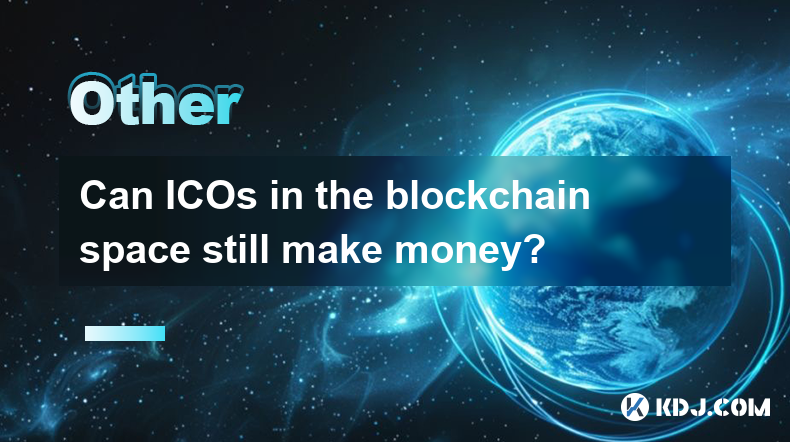
Can ICOs in the blockchain space still make money?
Apr 17,2025 at 08:29pm
The landscape of Initial Coin Offerings (ICOs) in the blockchain space has evolved significantly since their peak in 2017 and 2018. Despite the increased regulatory scrutiny and the rise of alternative fundraising methods like Security Token Offerings (STOs) and Initial Exchange Offerings (IEOs), ICOs can still be a viable way to raise funds and generat...
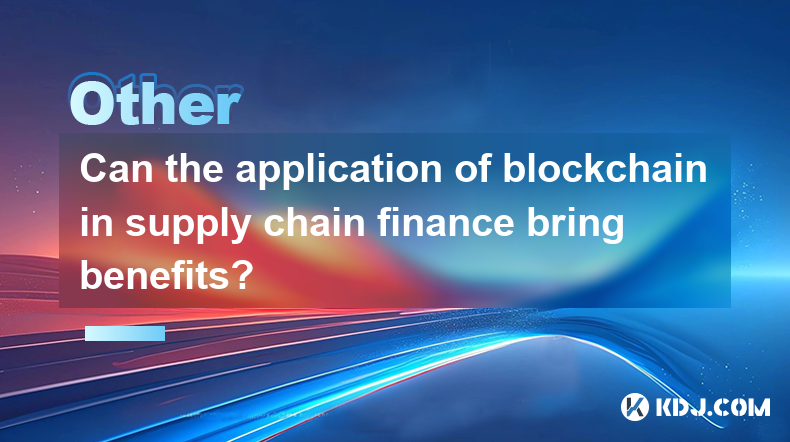
Can the application of blockchain in supply chain finance bring benefits?
Apr 15,2025 at 04:00pm
Can the application of blockchain in supply chain finance bring benefits? The integration of blockchain technology into supply chain finance has garnered significant attention in the cryptocurrency and financial sectors. This article explores how blockchain can potentially revolutionize supply chain finance, detailing its benefits and providing a compre...

Does the ranking of Chinese blockchain apps include cross-chain applications?
Apr 14,2025 at 04:00pm
The ranking of Chinese blockchain apps is a comprehensive evaluation that takes into account various aspects such as user base, transaction volume, and technological innovation. A pertinent question arises regarding whether these rankings include cross-chain applications. Cross-chain applications, which allow different blockchain networks to interact an...
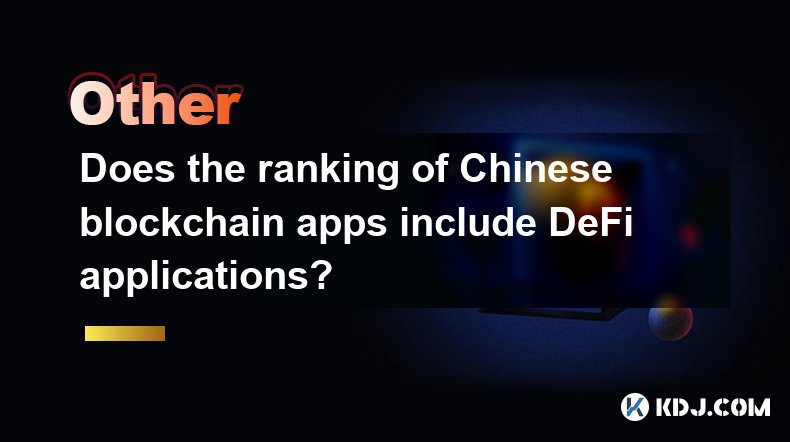
Does the ranking of Chinese blockchain apps include DeFi applications?
Apr 15,2025 at 06:57am
The ranking of Chinese blockchain apps is a comprehensive list that showcases the most popular and influential applications within the cryptocurrency ecosystem. One question that often arises is whether these rankings include DeFi applications. To answer this, we need to delve into the specifics of how these rankings are compiled and what types of appli...
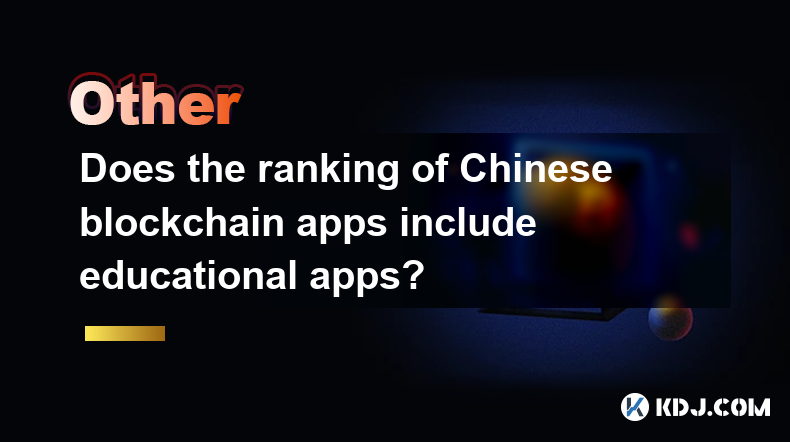
Does the ranking of Chinese blockchain apps include educational apps?
Apr 16,2025 at 03:35am
The ranking of Chinese blockchain apps often includes a variety of categories, from finance and gaming to social networking and beyond. One question that frequently arises is whether these rankings include educational apps. To address this, we need to delve into the specifics of how blockchain apps are categorized and ranked in China, and whether educat...
Does the ranking of Chinese blockchain apps include enterprise-level applications?
Apr 15,2025 at 06:42am
The ranking of Chinese blockchain apps often includes a variety of applications, ranging from consumer-focused to enterprise-level solutions. Understanding the scope and criteria for these rankings is essential to determine if enterprise-level applications are included. This article delves into the specifics of how Chinese blockchain app rankings are co...

Can ICOs in the blockchain space still make money?
Apr 17,2025 at 08:29pm
The landscape of Initial Coin Offerings (ICOs) in the blockchain space has evolved significantly since their peak in 2017 and 2018. Despite the increased regulatory scrutiny and the rise of alternative fundraising methods like Security Token Offerings (STOs) and Initial Exchange Offerings (IEOs), ICOs can still be a viable way to raise funds and generat...

Can the application of blockchain in supply chain finance bring benefits?
Apr 15,2025 at 04:00pm
Can the application of blockchain in supply chain finance bring benefits? The integration of blockchain technology into supply chain finance has garnered significant attention in the cryptocurrency and financial sectors. This article explores how blockchain can potentially revolutionize supply chain finance, detailing its benefits and providing a compre...

Does the ranking of Chinese blockchain apps include cross-chain applications?
Apr 14,2025 at 04:00pm
The ranking of Chinese blockchain apps is a comprehensive evaluation that takes into account various aspects such as user base, transaction volume, and technological innovation. A pertinent question arises regarding whether these rankings include cross-chain applications. Cross-chain applications, which allow different blockchain networks to interact an...

Does the ranking of Chinese blockchain apps include DeFi applications?
Apr 15,2025 at 06:57am
The ranking of Chinese blockchain apps is a comprehensive list that showcases the most popular and influential applications within the cryptocurrency ecosystem. One question that often arises is whether these rankings include DeFi applications. To answer this, we need to delve into the specifics of how these rankings are compiled and what types of appli...

Does the ranking of Chinese blockchain apps include educational apps?
Apr 16,2025 at 03:35am
The ranking of Chinese blockchain apps often includes a variety of categories, from finance and gaming to social networking and beyond. One question that frequently arises is whether these rankings include educational apps. To address this, we need to delve into the specifics of how blockchain apps are categorized and ranked in China, and whether educat...

Does the ranking of Chinese blockchain apps include enterprise-level applications?
Apr 15,2025 at 06:42am
The ranking of Chinese blockchain apps often includes a variety of applications, ranging from consumer-focused to enterprise-level solutions. Understanding the scope and criteria for these rankings is essential to determine if enterprise-level applications are included. This article delves into the specifics of how Chinese blockchain app rankings are co...
See all articles
























































































